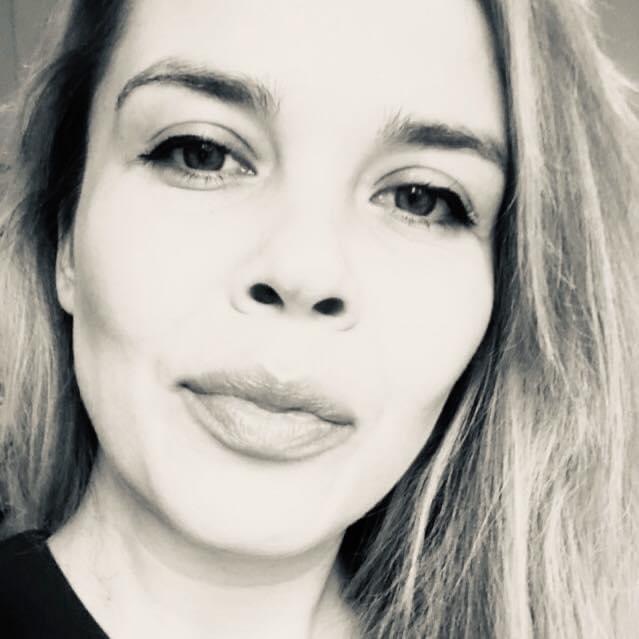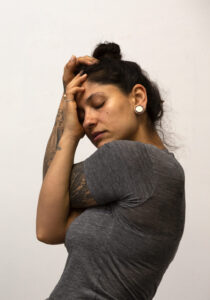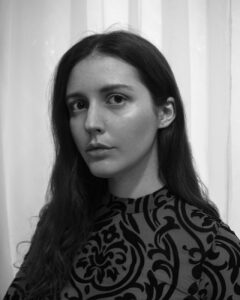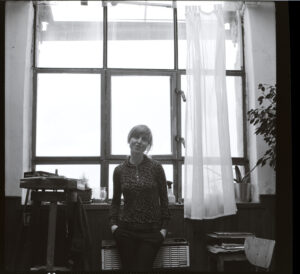Anna Molska

– born 1983. Anna is a visual artist who uses mainly the medium of film. She graduated from Professor Grzegorz Kowalski’s Audiovisual Space Studio at the Department of Sculpture of the Academy of Fine Arts in Warsaw. She collaborates with the Foksal Gallery Foundation in Warsaw. In her work, she analyses, among other things, the relations between the body, space and the conventions of their representation in visual arts and film. She is also interested in subjective interpretation of the tradition of modernism, especially in its forms in the socialist realities of the Eastern Bloc.
I am involved in art because I cannot imagine working any other way.
Film, the medium I use most, satisfies my need to analyse and interpret reality.
In my case, it is difficult to separate my identity from my profession. I identify myself with self-consciousness, and my profession is a way of expressing it.
Artistic research is for me one of the ways to understand the world, I often ask myself questions about the meaning of my own actions.
The social role of the artist in my interpretation is to show things in a new way, abandoning patterns of thinking.
My inspirations are very diverse. I am distrustful and still able to be surprised, so I have the ease of asking questions and the determination to find answers.
Everything is in a kind of continuity (process) and the resulting work is a result stopped at a certain moment in time.
I have never analysed how my practice has changed over the years. All I know is that I have less and less fear in me, which probably influences my current actions.
Art is a testimony to the times we live in. I don’t know what “our” reality is, I can only say that art is important in my illusion of reality.
My everyday life is constructed in relation to what I: need, want and what I have to. I am most comfortable with the predominance associated with “wanting”.
I don’t feel the work-life balance at all. I realised quite quickly that this is not possible for me. This makes me feel good and I don’t hold anything against me.
The status of women in my country is a topic for a solid academic paper. We still live in a patriarchal society. It is comforting to know that modern women are able to stand together and feel increasingly empowered.
My experience as a woman in the sphere of local action is extreme. I usually accept the status quo, but sometimes I encounter situations of sexual harassment.
My experience as a mother-artist has shown me that it is difficult to do art without financial comfort due to the amount of responsibilities associated with having children. Being a mother is one way for me to discover myself. It is also one of the greatest exercises in the ability to control emotions.
I don’t identify with art that aims to fix gender identity issues or operate techniques to make me heard. If an artist wants to do that, she should do that.
Feminism is a natural value for me. It is not a theme in my artistic practice, but it certainly influences it because it is, after all, a way of thinking.
Socio-political issues definitely influence my everyday life and my work. I react to what affects me, I look closely at reality.
We live in a time when one can feel the gradual build-up of restrictions, especially regarding control over our bodies. For some time now, it has been possible to observe the habituation of people to humility and civil obedience under the guise of care.
I turn to history whenever I feel the need. This was most evident during the making of the film The Weavers1, about the rebellion of the weavers in the Sowie Mountains. However, history was here a tool for understanding the mechanisms of rebellion.
I have a distance to national identity, despite the awareness that it is an inseparable part of me. I don’t adore my own country, but I do draw handfuls of themes related to it. I believe that the culture in which I was raised has many valuable aspects that should be used. When I looked at global art, I noticed that Polish art has a specific surplus which stems from our history, religion and upbringing. The spiritual element in this case is much deeper.
For me, politics is action, the ability to react. Creativity is always, to a greater or lesser degree, connected with it.
I try to look at art impersonally and I am not interested in the context of gender identity, but in the result itself.
For me, art is connected with the space of freedom. This is perhaps its last bastion.
The text was written in collaboration with Anna Kowalska (2020).
1Anna Molska, Weavers, 2009, film, 12’04’’, see: artmuseum.pl/pl/filmoteka/praca/molska-anna-tkacze![]()
– urodzona w 1983. Jest artystką wizualną, posługującą się przede wszystkim medium filmowym. Absolwentka Pracowni Przestrzeni Audiowizualnej prof. Grzegorza Kowalskiego na Wydziale Rzeźby Akademii Sztuk Pięknych w Warszawie. Współpracuje z Fundacją Galerii Foksal w Warszawie. W swoich pracach analizuje między innymi relacje ciała, przestrzeni i konwencji ich ujmowania w sztukach wizualnych i w filmie. Zajmuje ją również subiektywne odczytanie tradycji modernizmu, szczególnie w jego odsłonach w socjalistycznych realiach Bloku Wschodniego.
Zajmuję się sztuką, ponieważ nie mogę sobie wyobrazić pracy w inny sposób.
Film – medium, którego używam najczęściej, zaspokaja moje potrzeby związane z analizowaniem i interpretacją rzeczywistości.
W moim przypadku trudno oddzielić tożsamość od zawodu. Tożsamość identyfikuję ze świadomością siebie, a zawód to sposób na jej wyrażanie.
Badania artystyczne to dla mnie jeden ze sposobów na zrozumienie świata, często zadaję sobie pytania na temat sensu własnego działania.
Społeczna rola artysty w mojej interpretacji polega na pokazywaniu rzeczy w nowy sposób, porzucając schematy myślenia.
Moje inspiracje są bardzo różnorodne. Jestem nieufna i wciąż potrafię się dziwić, dzięki temu mam łatwość zadawania pytań i determinację w szukaniu odpowiedzi.
Wszystko jest w pewnego rodzaju ciągłości (procesie), a powstająca praca jest wynikową zatrzymaną w określonym momencie w czasie.
Nigdy nie analizowałam, jak na przestrzeni lat zmienia się moja praktyka. Wiem jedynie, że mam w sobie coraz mniej lęku, co pewnie wpływa na moje obecne działania.
Sztuka jest świadectwem czasów, w których żyjemy. Nie wiem, czym jest “nasza” rzeczywistość, mogę jedynie powiedzieć, że sztuka jest ważna w mojej iluzji rzeczywistości.
Moja codzienność konstruowana jest wobec tego, czego: potrzebuję, chcę i co muszę. Najbardziej odpowiada mi przewaga związana ze “chceniem”.
Zupełnie nie czuję równowagi pomiędzy życiem zawodowym a prywatnym. Dosyć szybko zrozumiałam, że w moim przypadku jest to nieosiągalne. Dzięki temu czuję się dobrze i nie mam do siebie żadnych pretensji.
Status kobiet w moim kraju jest tematem na solidną pracę naukową. Wciąż żyjemy w patriarchalnym społeczeństwie. Pocieszającym jest, że współczesne kobiety potrafią się solidaryzować i czują się coraz silniejsze.
Moje doświadczenia jako kobiety w sferze działania lokalnego są skrajne. Zazwyczaj akceptuję faktyczny stan rzeczy, ale bywa, że spotykam się z sytuacjami związanymi z molestowaniem seksualnym.
Doświadczenie matki-artystki pokazało mi, że bez komfortu finansowego trudno jest robić sztukę ze względu na ilość obowiązków związanych z potomstwem. Bycie matką jest dla mnie jednym ze sposobów na odkrywanie siebie. To również jeden największych treningów umiejętności panowania nad emocjami.
Nie identyfikuję się ze sztuką, która ma na celu naprawianie problemów tożsamości płciowej, czy operowanie technikami, by mnie słyszano. Jeśli artystka ma taką potrzebę, powinna to robić.
Feminizm jest dla mnie naturalną wartością. Nie jest tematem w mojej praktyce artystycznej, ale z pewnością wpływa na nią bo to przecież sposób myślenia.
Kwestie społeczno-polityczne zdecydowanie mają wpływ na moje codzienne życie i twórczość. Reaguję na to, co mnie dotyka, uważnie przyglądam się rzeczywistości.
Żyjemy w czasach, w których da się odczuć stopniowe nawarstwianie ograniczeń, szczególnie dotyczących kontroli nad naszymi ciałami. Od pewnego czasu można zaobserwować przyzwyczajanie ludzi do pokory i posłuszności obywatelskiej pod pozorem opieki.
Zwracam się ku historii jeżeli tylko czuję taką potrzebę. Najwyraźniej była ona widoczna podczas realizacji filmu Tkacze1, dotyczącego buntu tkaczy w Górach Sowich. Historia była tu jednak narzędziem do zrozumienia, jakimi mechanizmami rządzi się bunt.
Mam dystans do tożsamości narodowej, mimo świadomości, że to nierozerwalna część mnie. Nie mam w sobie uwielbienia dla własnego kraju, ale czerpię garściami z tematów z nim związanych. Uważam, że kultura, w której zostałam wychowana, ma w sobie wiele wartościowych aspektów, z których należy korzystać. Przyglądając się globalnej sztuce zauważyłam, że twórczość polska ma w sobie specyficzny naddatek, który wywodzi się z naszej historii, religii, wychowania. Duchowy pierwiastek w tym przypadku jest znacznie pogłębiony.
Polityka jest dla mnie działaniem, umiejętnością reagowania. Twórczość zawsze, w mniejszym lub większym stopniu, jest z nią powiązana.
Staram się patrzeć na sztukę bezosobowo i nie interesuje mnie kontekst tożsamości płciowej, a sam rezultat.
Sztuka wiąże się dla mnie z przestrzenią wolności. To być może ostatni z jej bastionów.
Tekst powstał we współpracy z Anną Kowalską (2020).
1Anna Molska, Tkacze, 2009, film, 12’04’’, zob. artmuseum.pl/pl/filmoteka/praca/molska-anna-tkacze![]()


